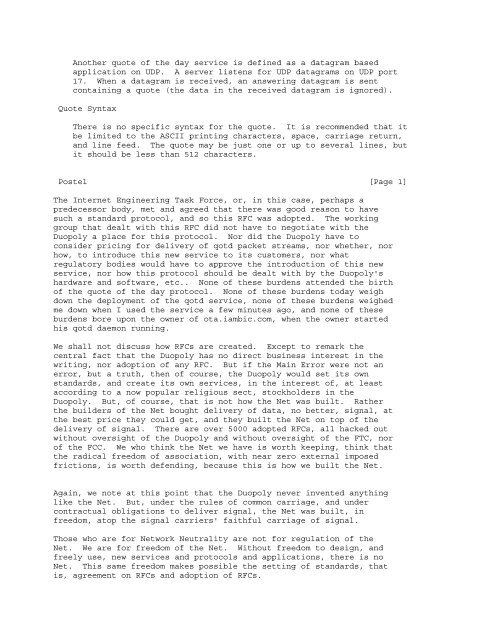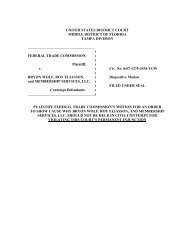Comments on the definition of the Internet and the importance of ...
Comments on the definition of the Internet and the importance of ...
Comments on the definition of the Internet and the importance of ...
Create successful ePaper yourself
Turn your PDF publications into a flip-book with our unique Google optimized e-Paper software.
Ano<strong>the</strong>r quote <strong>of</strong> <strong>the</strong> day service is defined as a datagram based<br />
applicati<strong>on</strong> <strong>on</strong> UDP. A server listens for UDP datagrams <strong>on</strong> UDP port<br />
17. When a datagram is received, an answering datagram is sent<br />
c<strong>on</strong>taining a quote (<strong>the</strong> data in <strong>the</strong> received datagram is ignored).<br />
Quote Syntax<br />
There is no specific syntax for <strong>the</strong> quote. It is recommended that it<br />
be limited to <strong>the</strong> ASCII printing characters, space, carriage return,<br />
<strong>and</strong> line feed. The quote may be just <strong>on</strong>e or up to several lines, but<br />
it should be less than 512 characters.<br />
Postel [Page 1]<br />
The <strong>Internet</strong> Engineering Task Force, or, in this case, perhaps a<br />
predecessor body, met <strong>and</strong> agreed that <strong>the</strong>re was good reas<strong>on</strong> to have<br />
such a st<strong>and</strong>ard protocol, <strong>and</strong> so this RFC was adopted. The working<br />
group that dealt with this RFC did not have to negotiate with <strong>the</strong><br />
Duopoly a place for this protocol. Nor did <strong>the</strong> Duopoly have to<br />
c<strong>on</strong>sider pricing for delivery <strong>of</strong> qotd packet streams, nor whe<strong>the</strong>r, nor<br />
how, to introduce this new service to its customers, nor what<br />
regulatory bodies would have to approve <strong>the</strong> introducti<strong>on</strong> <strong>of</strong> this new<br />
service, nor how this protocol should be dealt with by <strong>the</strong> Duopoly's<br />
hardware <strong>and</strong> s<strong>of</strong>tware, etc.. N<strong>on</strong>e <strong>of</strong> <strong>the</strong>se burdens attended <strong>the</strong> birth<br />
<strong>of</strong> <strong>the</strong> quote <strong>of</strong> <strong>the</strong> day protocol. N<strong>on</strong>e <strong>of</strong> <strong>the</strong>se burdens today weigh<br />
down <strong>the</strong> deployment <strong>of</strong> <strong>the</strong> qotd service, n<strong>on</strong>e <strong>of</strong> <strong>the</strong>se burdens weighed<br />
me down when I used <strong>the</strong> service a few minutes ago, <strong>and</strong> n<strong>on</strong>e <strong>of</strong> <strong>the</strong>se<br />
burdens bore up<strong>on</strong> <strong>the</strong> owner <strong>of</strong> ota.iambic.com, when <strong>the</strong> owner started<br />
his qotd daem<strong>on</strong> running.<br />
We shall not discuss how RFCs are created. Except to remark <strong>the</strong><br />
central fact that <strong>the</strong> Duopoly has no direct business interest in <strong>the</strong><br />
writing, nor adopti<strong>on</strong> <strong>of</strong> any RFC. But if <strong>the</strong> Main Error were not an<br />
error, but a truth, <strong>the</strong>n <strong>of</strong> course, <strong>the</strong> Duopoly would set its own<br />
st<strong>and</strong>ards, <strong>and</strong> create its own services, in <strong>the</strong> interest <strong>of</strong>, at least<br />
according to a now popular religious sect, stockholders in <strong>the</strong><br />
Duopoly. But, <strong>of</strong> course, that is not how <strong>the</strong> Net was built. Ra<strong>the</strong>r<br />
<strong>the</strong> builders <strong>of</strong> <strong>the</strong> Net bought delivery <strong>of</strong> data, no better, signal, at<br />
<strong>the</strong> best price <strong>the</strong>y could get, <strong>and</strong> <strong>the</strong>y built <strong>the</strong> Net <strong>on</strong> top <strong>of</strong> <strong>the</strong><br />
delivery <strong>of</strong> signal. There are over 5000 adopted RFCs, all hacked out<br />
without oversight <strong>of</strong> <strong>the</strong> Duopoly <strong>and</strong> without oversight <strong>of</strong> <strong>the</strong> FTC, nor<br />
<strong>of</strong> <strong>the</strong> FCC. We who think <strong>the</strong> Net we have is worth keeping, think that<br />
<strong>the</strong> radical freedom <strong>of</strong> associati<strong>on</strong>, with near zero external imposed<br />
fricti<strong>on</strong>s, is worth defending, because this is how we built <strong>the</strong> Net.<br />
Again, we note at this point that <strong>the</strong> Duopoly never invented anything<br />
like <strong>the</strong> Net. But, under <strong>the</strong> rules <strong>of</strong> comm<strong>on</strong> carriage, <strong>and</strong> under<br />
c<strong>on</strong>tractual obligati<strong>on</strong>s to deliver signal, <strong>the</strong> Net was built, in<br />
freedom, atop <strong>the</strong> signal carriers' faithful carriage <strong>of</strong> signal.<br />
Those who are for Network Neutrality are not for regulati<strong>on</strong> <strong>of</strong> <strong>the</strong><br />
Net. We are for freedom <strong>of</strong> <strong>the</strong> Net. Without freedom to design, <strong>and</strong><br />
freely use, new services <strong>and</strong> protocols <strong>and</strong> applicati<strong>on</strong>s, <strong>the</strong>re is no<br />
Net. This same freedom makes possible <strong>the</strong> setting <strong>of</strong> st<strong>and</strong>ards, that<br />
is, agreement <strong>on</strong> RFCs <strong>and</strong> adopti<strong>on</strong> <strong>of</strong> RFCs.

















